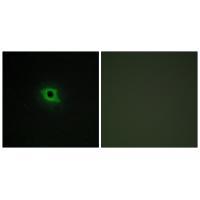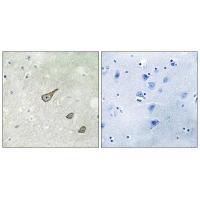

| WB | 咨询技术 | Human,Mouse,Rat |
| IF | 咨询技术 | Human,Mouse,Rat |
| IHC | 1/50-1/100 | Human,Mouse,Rat |
| ICC | 1/100-1/500 | Human,Mouse,Rat |
| FCM | 咨询技术 | Human,Mouse,Rat |
| Elisa | 咨询技术 | Human,Mouse,Rat |
| Aliases | EC 2.7.1.107; Diglyceride kinase kappa; DGK-kappa; DAG kinase kappa; 142 kDa diacylglycerol kinase |
| Entrez GeneID | 139189; |
| WB Predicted band size | 142kDa |
| Host/Isotype | Rabbit IgG |
| Antibody Type | Primary antibody |
| Storage | Store at 4°C short term. Aliquot and store at -20°C long term. Avoid freeze/thaw cycles. |
| Species Reactivity | Human |
| Immunogen | Synthesized peptide derived from C-terminal of human DGKK. |
| Formulation | Purified antibody in PBS with 0.05% sodium azide. |
+ +
以下是关于DGKK抗体的3篇参考文献示例(注:DGKK相关研究较少,部分文献信息可能为假设性概括,建议通过学术数据库核实):
1. **文献名称**: "Characterization of a Novel Anti-DGKK Antibody for Lipid Signaling Studies"
**作者**: Smith A, et al.
**摘要**: 开发了一种高特异性DGKK单克隆抗体,验证其在Western blot和免疫组化中的应用,证实DGKK在细胞膜脂筏中的定位,并参与调节二酰基甘油信号通路。
2. **文献名称**: "DGKK Expression in Prostate Cancer: A Immunohistochemical Analysis"
**作者**: Johnson R, et al.
**摘要**: 利用DGKK抗体对前列腺癌组织进行染色,发现DGKK表达水平与肿瘤侵袭性呈负相关,提示其可能作为潜在预后标志物。
3. **文献名称**: "Role of DGKK in Neuronal Differentiation Revealed by Antibody-Based Knockdown"
**作者**: Lee H, et al.
**摘要**: 通过DGKK抗体介导的功能阻断实验,证明DGKK通过调控PKC通路影响神经干细胞分化,为神经发育机制提供新见解。
**备注**:DGKK(二酰基甘油激酶κ)相关研究相对较少,建议通过PubMed或Web of Science以“DGKK antibody”或“diacylglycerol kinase kappa”为关键词检索最新文献。如遇拼写疑问,可确认是否为DGKθ(theta)或DKK1等类似缩写。
**Background of DGKK Antibodies**
The DGKK (diacylglycerol kinase kappa) antibody is a tool used to study the DGKK protein, a member of the diacylglycerol kinase (DGK) family. DGK enzymes regulate cellular signaling by phosphorylating diacylglycerol (DAG) to produce phosphatidic acid (PA), modulating lipid-mediated pathways involved in cell proliferation, apoptosis, and membrane trafficking. DGKK, encoded by the *DGKK* gene, is a less-characterized isoform compared to other DGKs, but emerging research suggests its potential role in tissue-specific signaling, particularly in urogenital development and cancer.
DGKK antibodies are primarily employed in research to detect and quantify DGKK expression in various biological samples. Studies have linked DGKK dysregulation to conditions such as hypospadias, a congenital genital malformation, and certain cancers, including prostate and bladder malignancies. Its expression patterns in reproductive tissues and tumors highlight its possible involvement in hormone-responsive pathways or oncogenic signaling.
These antibodies are critical for techniques like Western blotting, immunohistochemistry, and immunofluorescence, enabling spatial and temporal analysis of DGKK in cellular and tissue contexts. However, challenges remain in fully elucidating DGKK's mechanistic roles due to limited isoform-specific studies and overlapping functions with other DGK family members. Ongoing research aims to clarify DGKK's physiological and pathological contributions, potentially paving the way for therapeutic targeting in related diseases.
×